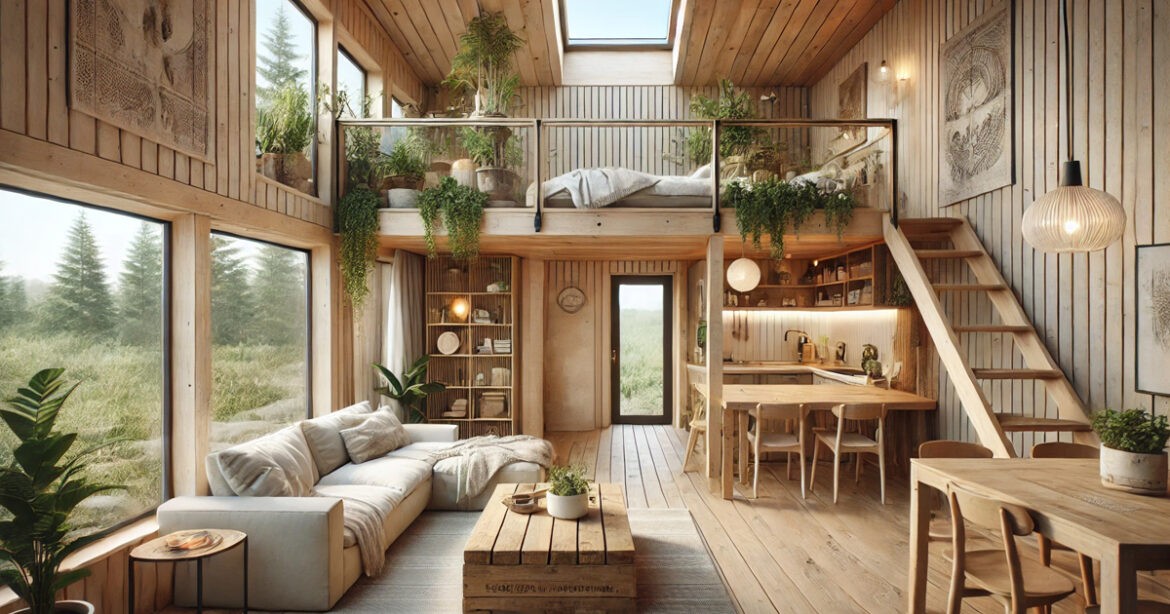Eco-friendly vacation rentals are gaining popularity as more travelers look for sustainable stays. People want to reduce their carbon footprint without giving up comfort. These rentals use green practices to minimize waste, save energy, and protect the environment.
Many travelers prefer vacation rentals that align with their eco-conscious lifestyle. Airbnb and other platforms now highlight listings with sustainable features. From solar panels to organic bedding, eco-friendly vacation rentals offer a responsible way to travel. Choosing one helps the planet and supports hosts who care about sustainability.
What Makes a Vacation Rental Eco-Friendly?
Use of Renewable Energy Sources
Eco-friendly vacation rentals stand out by using sustainable energy sources. Instead of relying on fossil fuels, many rentals harness solar panels or wind power. This reduces carbon emissions and makes energy use more efficient.
Solar panels are a popular choice. They generate electricity from sunlight, cutting down on traditional energy consumption. In sunny locations, some rentals produce all the power they need. Guests can enjoy a comfortable stay knowing their energy use is clean and renewable.
Wind power is another great option. Some vacation rentals use small wind turbines to generate electricity. This works best in windy areas, helping hosts run a greener business. Combining wind and solar energy creates a reliable, eco-friendly power source.
Energy-Efficient Appliances and Lighting
Eco-friendly vacation homes go beyond just renewable energy. They also use energy-efficient appliances and lighting to cut down on electricity use. This helps reduce waste and keeps the rental sustainable.
Many rentals feature Energy Star-rated appliances, which use less power without sacrificing performance. Energy-efficient refrigerators, washing machines, and air conditioners help lower electricity consumption. Guests can enjoy modern comforts while using less energy.
Lighting also plays a big role. Instead of traditional bulbs, eco-friendly vacation rentals use LED lights. These bulbs last longer and use up to 75% less energy. Some rentals even have motion-sensor lights, which turn off automatically when not needed.
Sustainable Building Materials and Design
Eco-friendly vacation rentals are often built with sustainable materials that reduce environmental impact. Instead of traditional materials, these rentals use eco-friendly options that last longer and save energy. They also cause less harm to the planet.
Many rentals feature reclaimed wood, which gives homes a rustic yet stylish look while reducing tree cutting. Others use bamboo, a fast-growing and renewable resource, for flooring, furniture, or even entire structures. Some eco-friendly properties incorporate recycled materials, like glass, metal, and repurposed bricks, into their design.
Good design also matters. Many eco-friendly vacation rentals use passive cooling and heating techniques to reduce energy needs. Large windows allow natural light to brighten spaces, reducing the need for artificial lighting. Smart insulation and ventilation help maintain comfortable temperatures without excessive heating or cooling.
Sustainable design makes a vacation home more energy-efficient, stylish, and environmentally responsible. Travelers can enjoy a unique stay while supporting eco-friendly architecture.
Water Conservation Techniques
Eco-friendly vacation homes focus on water-saving solutions to reduce waste and promote eco-friendliness. Many rentals install low-flow fixtures, which cut water use without affecting performance. Showers, faucets, and toilets designed for efficiency can save thousands of gallons of water each year.
Some hosts go a step further with rainwater harvesting systems. These systems collect and store rainwater for irrigation, laundry, or even flushing toilets. This reduces dependence on municipal water sources and helps conserve local water supplies.
Landscaping also plays a role. Eco-conscious rentals often use drought-resistant plants and native vegetation that require less watering. Some properties even recycle greywater—used water from sinks and showers—for irrigation.
Waste Reduction and Recycling Programs
Eco-friendly vacation rentals minimize waste by promoting recycling, composting, and plastic-free alternatives. Many rentals provide clearly labeled recycling bins, making it easy for guests to sort their waste. Some properties also offer composting options to reduce food waste.
To limit single-use plastics, eco-friendly rentals provide reusable alternatives. Guests might find glass water bottles, stainless steel straws, or environmentally friendly toiletries instead of plastic-packaged items. Some hosts even supply refillable soap and shampoo dispensers, cutting down on unnecessary plastic waste.
Sustainable rentals also focus on reducing overall waste. They use minimal packaging, upcycled furniture, and second-hand decor to give items a new life. Some even partner with local zero-waste businesses to provide eco-friendly guest supplies.

Benefits of Staying in an Eco-Friendly Vacation Rental
Choosing eco-friendly vacation rentals isn’t just about helping the environment—it also enhances the travel experience. These sustainable stays offer comfort, health benefits, and a deeper connection to nature and local communities.
Reduced Carbon Footprint
Eco-friendly vacation rentals use renewable energy, energy-efficient appliances, and water-saving techniques to minimize waste. This means lower carbon emissions compared to traditional places to stay. Guests can enjoy a guilt-free stay, knowing they are reducing their environmental impact.
Healthier Indoor Environment
Many eco-friendly rentals avoid harsh chemicals and artificial materials. They use non-toxic cleaning products, organic bedding, and air cleaning systems to create a healthier space. Guests with allergies or sensitivities will appreciate better air quality and a fresher atmosphere.
Contribution to Local Sustainability Efforts
Eco-friendly vacation rentals often support local businesses, farmers, and artisans by sourcing food, furniture, and supplies sustainably. Some rentals donate part of their revenue to conservation projects or community development. Staying in one helps fund eco-conscious initiatives and keeps money within the local economy.
Unique and Immersive Eco-Conscious Experiences
Sustainable rentals offer unique stays, like a solar-powered treehouse or an off-grid cabin. Guests can also book a tiny home built with green materials. Some rentals include eco-tours, farm-to-table dining, or nature activities. These experiences help guests connect with the environment in a meaningful way.
How to Find an Eco-Friendly Vacation Rental
Finding the perfect Eco-Friendly Vacation Rental requires some research. While many listings claim to be sustainable, not all follow through. To make sure you’re booking a truly green stay, consider these key factors.
Search for Green Certifications
One of the easiest ways to identify eco-friendly vacation rentals is by looking for recognized sustainability certifications. Properties that meet strict environmental standards earn these certifications. Some of the most trusted ones include:
- LEED (Leadership in Energy and Environmental Design) – Focuses on energy efficiency, water conservation, and sustainable construction materials.
- Green Key Certification – Awarded to short-term rentals that reduce waste. It also recognizes properties that use resources responsibly.
- EarthCheck Certification – Evaluates properties based on eco-friendly benchmarks like carbon footprint, energy use, and waste management.
Many vacation rental platforms, including Airbnb and Booking.com, now highlight eco-badges for listings with verified green features. These badges make it easier to find rentals that prioritize eco-friendliness. However, not all green vacation rentals have certifications, so it’s important to check other factors as well.
Check Listings for Sustainability Features
A truly eco-friendly rental should be more than a marketing claim. It must have real sustainable features. When browsing listings, look for details such as:
- Renewable energy sources like solar panels or wind turbines, which help reduce reliance on fossil fuels.
- Energy-efficient appliances (e.g., refrigerators, washers, air conditioners) that reduce electricity use.
- Low-flow water fixtures that minimize water waste in sinks, showers, and toilets.
- Recycling and composting programs, showing the rental’s commitment to waste management.
- Sustainable materials in furniture and decor, such as bamboo flooring or reclaimed wood.
- Eco-friendly amenities, including organic bedding, environmentally friendly toiletries, and refillable soap dispensers.
- Smart technology, like motion-sensor lights and smart thermostats, to reduce unnecessary energy consumption.
If a listing doesn’t mention these features, don’t assume they aren’t there. Some hosts forget to list their eco-friendly efforts in their descriptions. It’s worth messaging them directly to ask for details.
Look for Hosts Who Promote Eco-Conscious Practices
An Eco-Friendly Vacation Rental isn’t just about the property itself—it’s also about how the host runs it. A truly eco-conscious host will actively promote sustainable living by:
- Providing reusable alternatives like cloth napkins, stainless steel straws, and glass water bottles instead of disposable plastic.
- Offering eco-guides for guests, including tips on energy conservation, responsible tourism, and recycling instructions.
- Partnering with local sustainable businesses, such as organic farms, zero-waste stores, and fair-trade cafes.
- Encouraging low-impact travel, such as bike rentals, public transportation guides, or electric vehicle charging stations.
- Using non-toxic, biodegradable cleaning products to keep the rental safe and chemical-free.
- Supporting community initiatives, like tree-planting programs or local conservation projects.
A good host will be happy to explain their eco-friendly efforts. If a rental claims to be green but the host can’t explain how, that’s a red flag. It may not be as eco-friendly as advertised.
Read Guest Reviews Mentioning Eco-Friendly Efforts
Guest reviews are one of the best ways to confirm if a rental is truly sustainable. Look for reviews that mention:
- Solar panels or energy-efficient systems, proving the rental runs on clean energy.
- Recycling and composting programs, ensuring that they manage waste properly.
- Organic or locally sourced amenities, such as eco-friendly toiletries or farm-to-table food options.
- Non-toxic cleaning practices, ensuring a healthier indoor environment.
- Water conservation efforts, like rainwater harvesting or low-flow fixtures.
- Eco-conscious host practices, such as providing guests with reusable shopping bags, refillable water bottles, or sustainability tips.
If multiple guests highlight these efforts, it’s a strong sign that the rental is genuinely eco-friendly. If reviews mention wasteful practices, like excessive plastic use, that’s a concern. A lack of recycling also suggests the rental isn’t as green as it seems.
Top Eco-Friendly Vacation Rental Destinations
Travelers looking for eco-friendly vacation rentals can find incredible destinations that prioritize sustainability. Some places lead the way with green initiatives, offering eco-conscious rentals, responsible tourism practices, and breathtaking natural beauty. Here are a few top destinations where you can enjoy a sustainable stay.
Costa Rica – A Pioneer in Eco-Tourism
Costa Rica is one of the most eco-friendly destinations in the world. Nearly 99% of its electricity comes from renewable sources, and the country is committed to becoming carbon-neutral. Many eco-friendly vacation rentals in Costa Rica use solar power, rainwater collection systems, and sustainable building materials.
Visitors can stay in eco-lodges surrounded by rainforests. These places offer wildlife programs, organic farms, and nature tours that support local communities. Whether you’re hiking in Monteverde or relaxing on Nicoya Peninsula’s beaches, Costa Rica is a great eco-friendly getaway. It blends sustainability with adventure.
Bali, Indonesia – Sustainable Stays in Paradise
Bali has become a global hotspot for sustainable tourism. The island is home to numerous eco-friendly vacation rentals, from bamboo villas to off-grid jungle retreats. Many rentals use solar energy, composting toilets, and natural ventilation to minimize their environmental impact. Ubud, the cultural heart of Bali, thrives on eco-conscious living.
Guests can stay in resorts that support local artisans, organic farms, and waste-free initiatives. Some properties even offer sustainable farming workshops and eco-conscious yoga retreats. For a truly green experience, visitors can explore Bali’s eco-cafes and ethical wildlife sanctuaries. They can also join community-led conservation projects.
Scandinavia – Leading the Way in Green Living
Nordic countries — Sweden, Norway, Denmark, and Finland commit to sustainability. Many eco-friendly vacation rentals here feature minimalist, energy-efficient architecture that blends seamlessly with nature. Sweden’s Treehotel, for example, features cabins suspended in trees, offering breathtaking views with low environmental impact.
Norway’s eco-lodges along the fjords run on renewable energy. Finland’s glass igloos offer a sustainable way to see the Northern Lights. Travelers can also enjoy electric vehicle-friendly cities, organic food options, and vast protected landscapes. That make this Nordic country a leader in green tourism.
New Zealand – Nature Conservation and Eco-Stays
New Zealand is committed to preserving its incredible landscapes through sustainable tourism initiatives. Many eco-friendly rentals here follow strict green guidelines. They offer off-grid cabins, solar-powered retreats, and nature-friendly lodges.
The country promotes the Tiaki Promise, a commitment to protecting the environment while traveling. Visitors can stay on sustainable farms or book zero-waste lodges in Queenstown. They can also relax in geothermal-powered stays in Rotorua. Activities like hiking in national parks, visiting conservation centers, and supporting local eco-businesses make New Zealand a dream destination for responsible travelers.
Portugal – Europe’s Hidden Eco-Gem
Portugal has made significant efforts to embrace sustainable tourism. Many eco-friendly vacation rentals popping up across the country. The Alentejo region and Azores Islands offer eco-conscious stays. They feature solar-powered farmhouses, sustainable vineyards, and eco-resorts with organic gardens.
In Lisbon and Porto, travelers can find boutique eco-hotels and green-certified vacation rentals. The country is also investing in renewable energy, plastic-free initiatives, and responsible tourism projects. They do it to protect its coastal beauty and natural parks.
Tips for Hosting an Eco-Friendly Vacation Rental
Building an eco-friendly rental isn’t just about green energy. It’s about smart choices that cut waste and improve the guest experience. Here are some practical ways to make your rental more eco-friendly and attract conscious travelers.
Use Sustainable Furnishings and Decor
Choose eco-friendly furniture made from reclaimed wood, bamboo, or recycled materials. Instead of mass-produced decor, opt for handcrafted pieces from local artisans. Sustainable textiles, like organic cotton or linen, add a touch of luxury while being better for the environment. Avoid synthetic carpets and use natural fiber rugs like wool or jute, which are environmentally friendly and non-toxic.
Provide Guests with Eco-Friendly Amenities
Small changes can make a big impact. Stock your rental with reusable glass or stainless steel water bottles instead of single-use plastic. Swap out mini toiletries for organic, refillable soap and shampoo dispensers.
Offer environmentally friendly cleaning products and compostable trash bags. Even simple additions like cloth napkins instead of paper ones can make your rental more sustainable.
Encourage Responsible Energy and Water Use
Make it easy for guests to reduce their energy and water consumption. Install a smart thermostat that adjusts temperatures automatically. Provide clear instructions for turning off lights and appliances when not in use.
Set up low-flow showerheads and faucets to minimize water waste. A simple note in the welcome guide can remind guests to be mindful of their usage.
Partner with Local Businesses to Promote Sustainable Tourism
Support the local economy while keeping your rental eco-friendly. Partner with organic farms, fair-trade cafes, and eco-conscious tour operators to provide guests with unique, responsible experiences. Leave a guidebook featuring sustainable restaurants, farmer’s markets, and nature-friendly activities. If possible, source your welcome basket from local producers, including organic coffee, handmade soaps, or farm-fresh treats.
Conclusion
Eco-friendly vacation rentals are more than just a trend—they are the future of responsible travel. By choosing sustainable stays, travelers reduce their environmental impact, support local communities, and enjoy healthier, greener vacation rentals.
Hosts, in turn, can create unique experiences that align with a growing demand for sustainable tourism. Hosts who want to boost their eco-friendly rental can use dynamic pricing tools like DPGO. These tools help increase earnings and reinvest in sustainability.
DPGO helps optimize pricing based on real-time market data, ensuring higher occupancy rates and increased revenue. Smart pricing helps hosts fund green upgrades like solar panels and water-saving fixtures. It also allows them to add eco-friendly guest amenities, making the rental even greener.








Comments are closed.